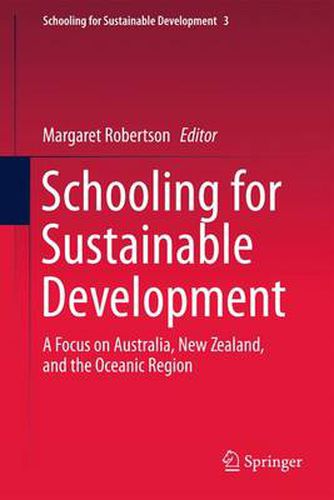Readings Newsletter
Become a Readings Member to make your shopping experience even easier.
Sign in or sign up for free!
You’re not far away from qualifying for FREE standard shipping within Australia
You’ve qualified for FREE standard shipping within Australia
The cart is loading…






This title is printed to order. This book may have been self-published. If so, we cannot guarantee the quality of the content. In the main most books will have gone through the editing process however some may not. We therefore suggest that you be aware of this before ordering this book. If in doubt check either the author or publisher’s details as we are unable to accept any returns unless they are faulty. Please contact us if you have any questions.
This book Schooling for Sustainable Development: A Focus on Australia, New Zealand and the Oceanic Region, is the product of passionate interests of teachers, scholars and researchers located in diverse parts of the Australasian region. Working with their colleagues within local contexts they have conducted research and gathered together information for practitioners and students interested in learning more about sustainable lifestyle practices. Some of the work has taken place in remote locations and some has been in within the confines of major cities. The Australasian Region brings together people and cultures that link traditional economies to global networks and lifestyles. Diverse terrain, politics and responses typify the region. Close to Asia there are lingering ties with old European ways and cultural beliefs. The major economies of Australia and New Zealand provide the lead with development practices for lesser economies such as Papua New Guinea, Fiji and the many island nations scattered throughout the South Pacific. This complexity is not easily represented. Key issues relate to land ownership, mobilities within the region and the gradual dissemination of knowledge, skills and wealth. The book will provide both reference material and interesting reading for teachers, researchers and practitioners in interested in community based perspectives on sustainability. We have learnt from each other and hope that others will benefit from our efforts.
$9.00 standard shipping within Australia
FREE standard shipping within Australia for orders over $100.00
Express & International shipping calculated at checkout
This title is printed to order. This book may have been self-published. If so, we cannot guarantee the quality of the content. In the main most books will have gone through the editing process however some may not. We therefore suggest that you be aware of this before ordering this book. If in doubt check either the author or publisher’s details as we are unable to accept any returns unless they are faulty. Please contact us if you have any questions.
This book Schooling for Sustainable Development: A Focus on Australia, New Zealand and the Oceanic Region, is the product of passionate interests of teachers, scholars and researchers located in diverse parts of the Australasian region. Working with their colleagues within local contexts they have conducted research and gathered together information for practitioners and students interested in learning more about sustainable lifestyle practices. Some of the work has taken place in remote locations and some has been in within the confines of major cities. The Australasian Region brings together people and cultures that link traditional economies to global networks and lifestyles. Diverse terrain, politics and responses typify the region. Close to Asia there are lingering ties with old European ways and cultural beliefs. The major economies of Australia and New Zealand provide the lead with development practices for lesser economies such as Papua New Guinea, Fiji and the many island nations scattered throughout the South Pacific. This complexity is not easily represented. Key issues relate to land ownership, mobilities within the region and the gradual dissemination of knowledge, skills and wealth. The book will provide both reference material and interesting reading for teachers, researchers and practitioners in interested in community based perspectives on sustainability. We have learnt from each other and hope that others will benefit from our efforts.